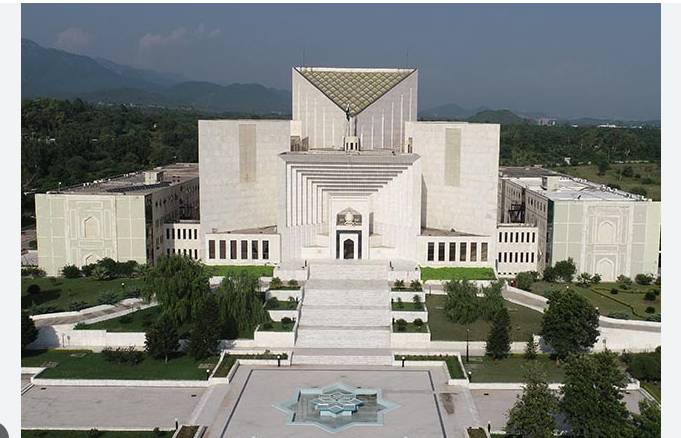SC wants to know whether defendants given fair trial in military courts: Judge
Defence Ministry counsel says no court can discuss merits, demerits of military trials: Justice Rizvi says there could be no punishment unless suspect given right to defence: Khawaja Haris says basic human rights cease to exist under article 3(8): Bench directs Haris to submit record of civilians who underwent military trials

Stay tuned with 24 News HD Android App

Justice Hassan Azhar Rizvi of the constitutional bench (CB) of the Supreme Court (SC) on Thursday said it was unfortunate that the government refused to show the court the record of the cases, which military courts heard, reported 24NewsHD TV channel.
During the hearing of intra-court appeals filed against declaring the trials of civilians in military courts null and void, the judge said the court wanted to know whether eyewitnesses’ accounts were taken into account prior to giving decisions in these cases.
A seven-member CB, headed by Justice Aminuddin Khan, heard the appeals.
Claiming that there was a complete procedure for a trial in a military court, Khawaja Haris, counsel for the Ministry of Defence, said the government could show the record of just one case.
Justice Muhammad Ali Mazhar remarked that the bench wanted to confirm whether the requirements for a fair trial were met during military trials.
However, Haris said that neither the high courts nor the SC had the power to review the merits and demerits of these trials.
Justice Rizvi said that justice demanded that a suspect could not be awarded a penalty until and unless he was allowed to defend himself.
Haris, however, insisted that the apex court could not review the military courts’ verdicts to ascertain whether the fundamental human rights of suspects were safeguarded. “Under articles (3) 8 and 5 (8), petitions against military trials are inadmissible for hearing.”
The counsel went on to say that in the FB Ali case, these were retired officials who had committed the offence.
Justice Jamal Mandokhel asked whether under Article (3) 8, a defendant stood deprived of his or her rights.
Haris replied that the article had been included in the constitution of 1973 since the beginning.
Justice Naeem Akhtar Afghan said that a five-member larger bench of the apex court, in its decision, had declared some of the sections of the Army Act null and void. “And we later suspended that verdict,” he added.
If these sections remained suspended, the judge went on to say, no retired army officer could be tried in a military court. “Even those who are undergoing military trial could not be court-martialled either.”
Justice Afghan said that the words ‘armed persons’ had been replaced with the words, ‘several persons’ in Section 2-D (1). “And it is because of that that civilians are being tried in military courts.”
The judge said in his opinion the amendment was made to the Army Act so that retired army officers could also be tried in military courts. “If the words ‘retired officers’ had been inserted in the amendment, then there would not have been any ambiguity,” he opined.
Justice Afghan said either this was done deliberately or it was only a mistake.
Haris said that the fundamental rights of the suspects ceased to exist under Article 3 (8).
Justice Mandokhel asked what purpose the Army Act served. “Whether its purpose is to create discipline in the armed forces or to check criminal activities.”
Haris replied that it was aimed at ensuring that nobody created obstacles in the discharge of functions by the army personnel.
Justice Mandokhel opined if there was a separate legislation to cover criminal activities, then such issues would not have arisen.
The bench directed Defence Ministry’s counsel to submit details of the civilians who had undergone military trials.
Haris could not conclude his arguments even today. Justice Mandokhel directed him to finish them tomorrow. The lawyer assured him that he would try his best.
The court adjourned the case’s hearing until tomorrow.
Reporter: Amanat Gishkori
